Charles E W Bean, Diaries, AWM38 3DRL 606/99/1 - February 1918
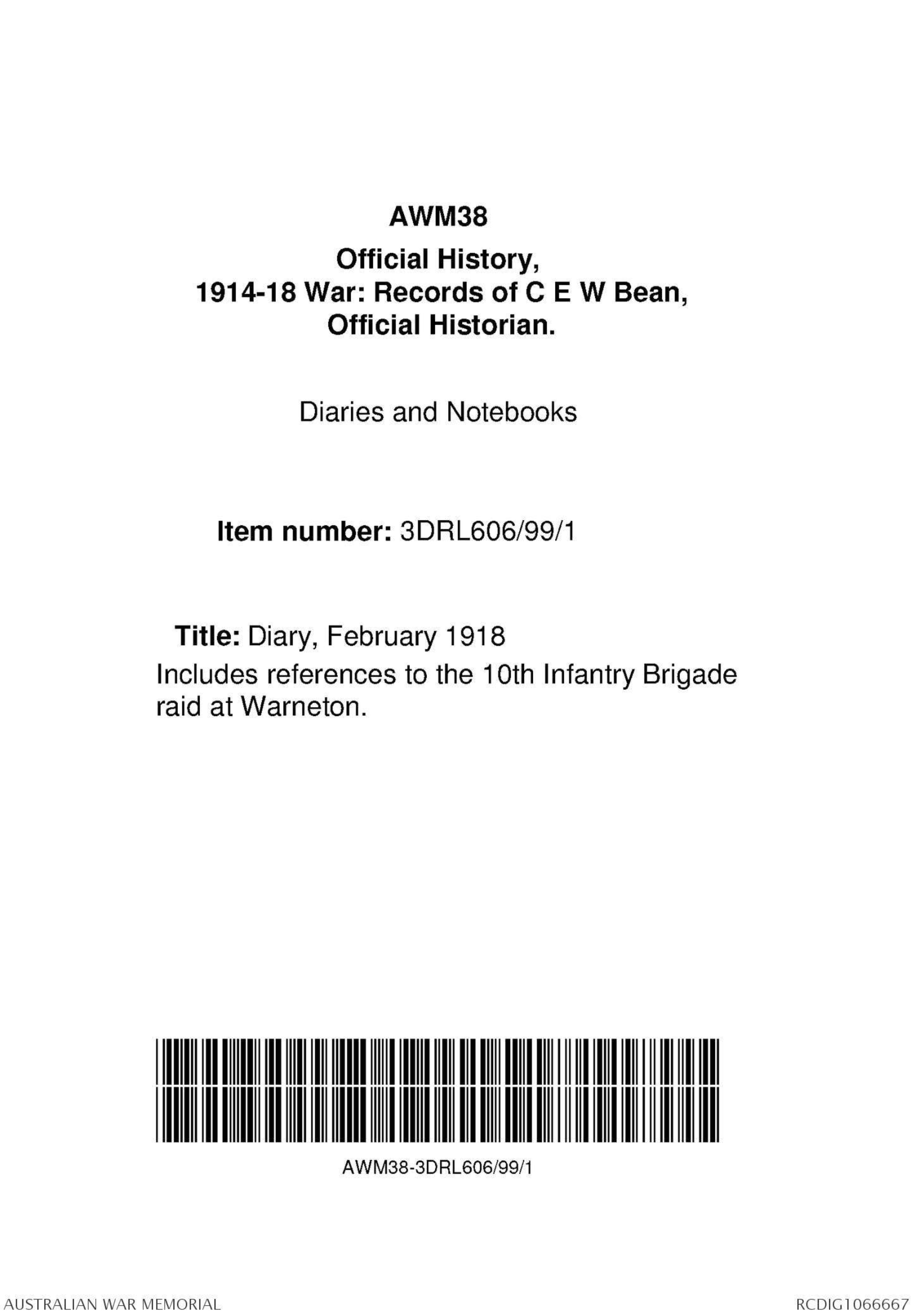
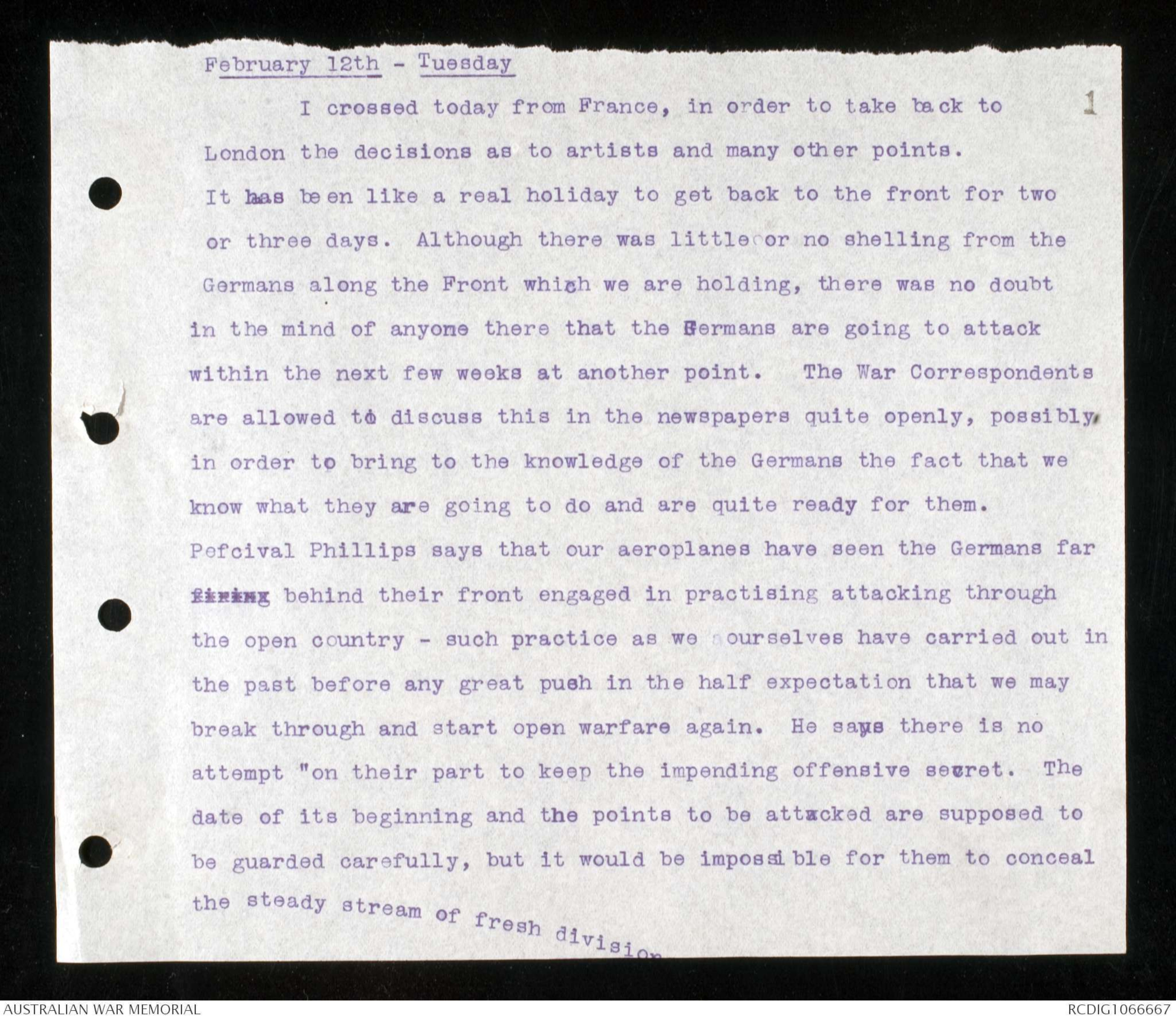
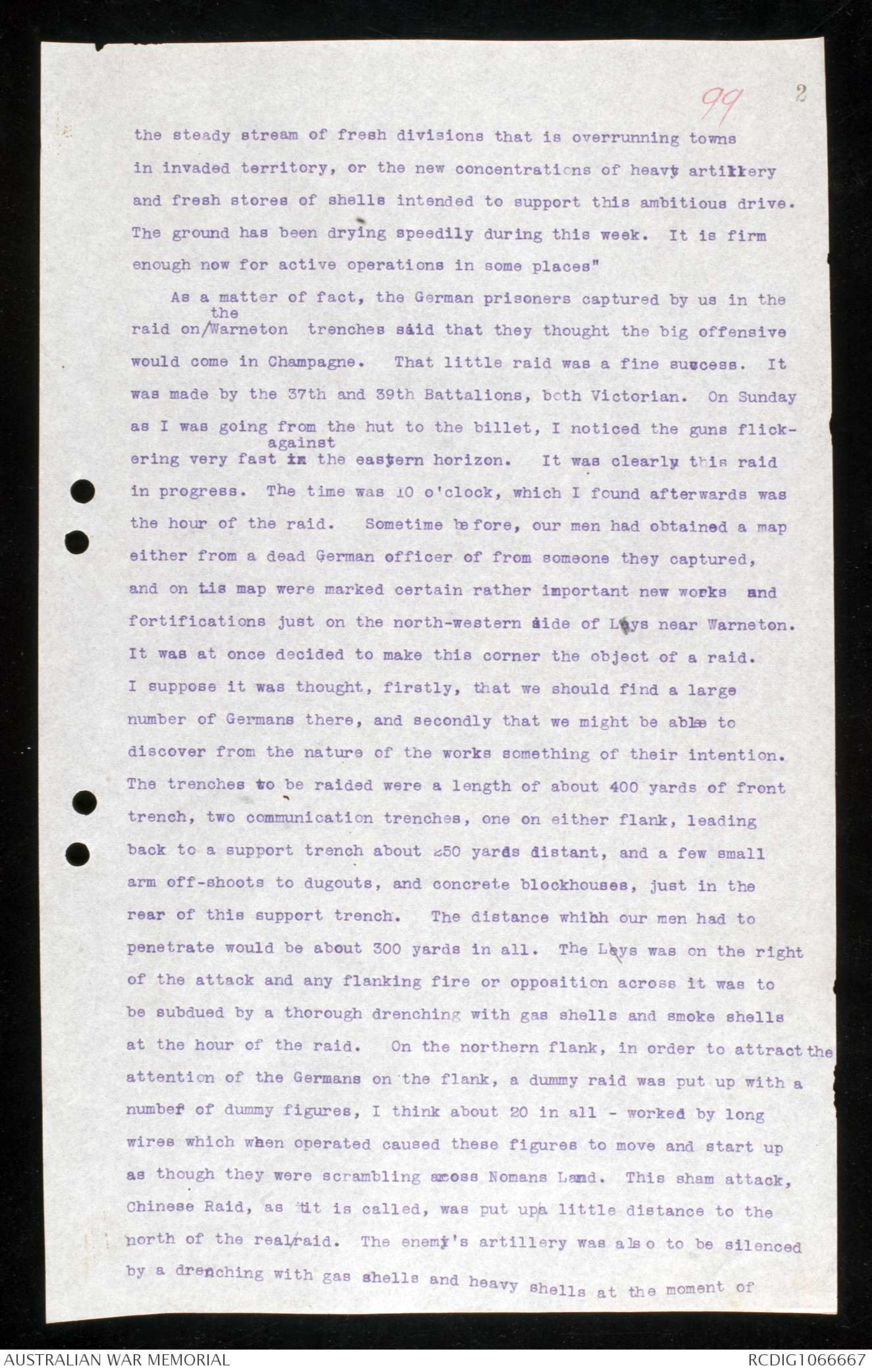
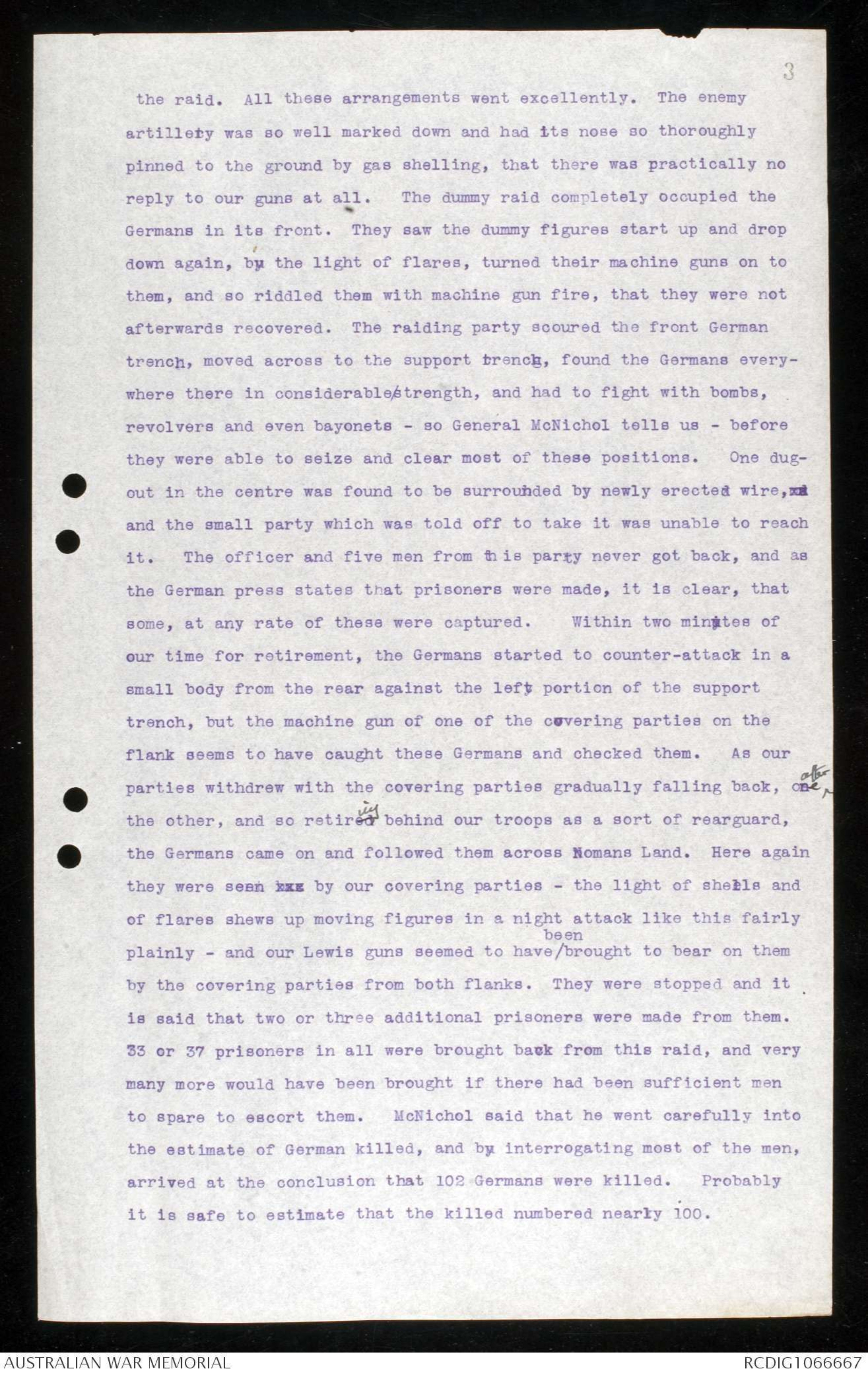
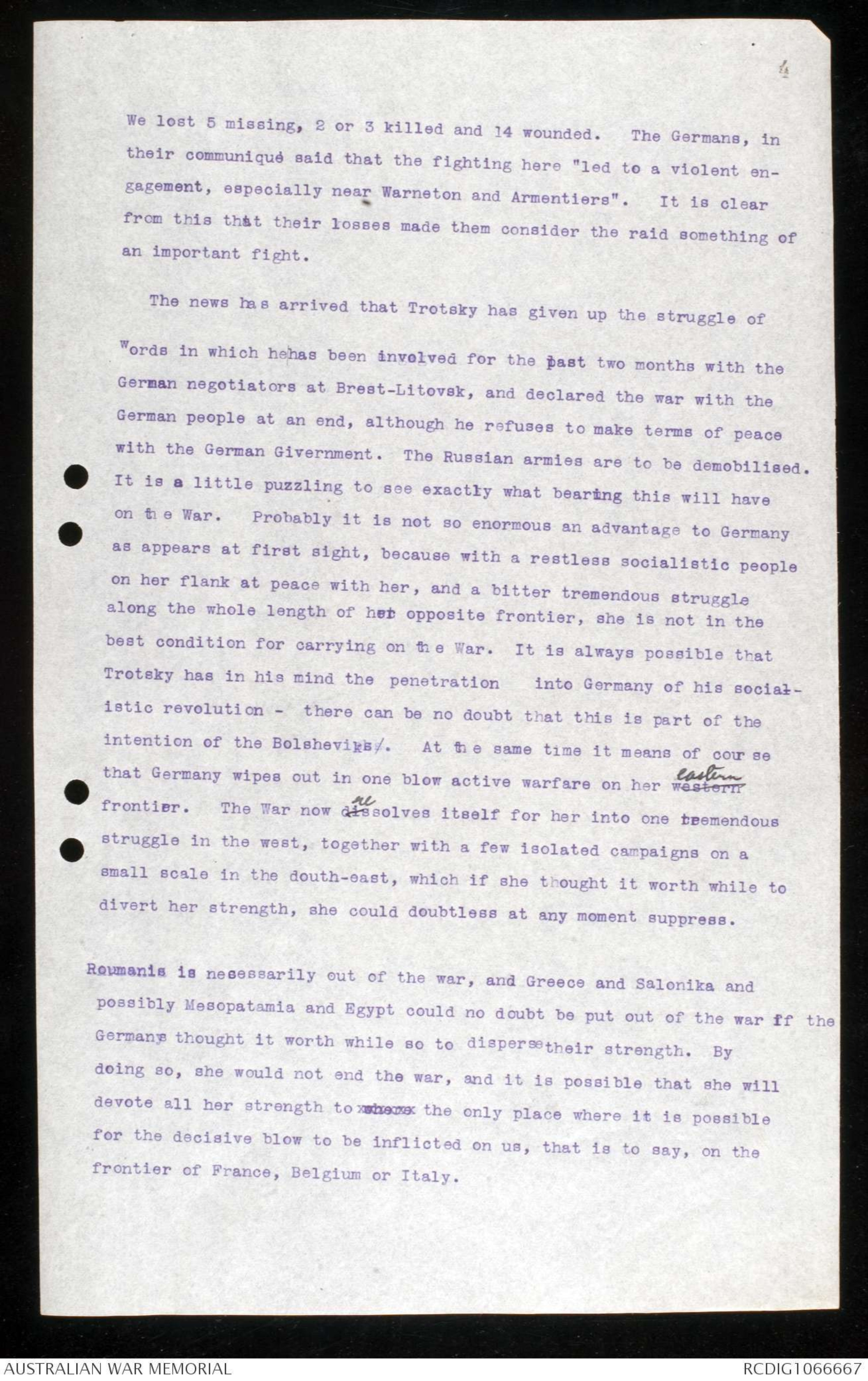
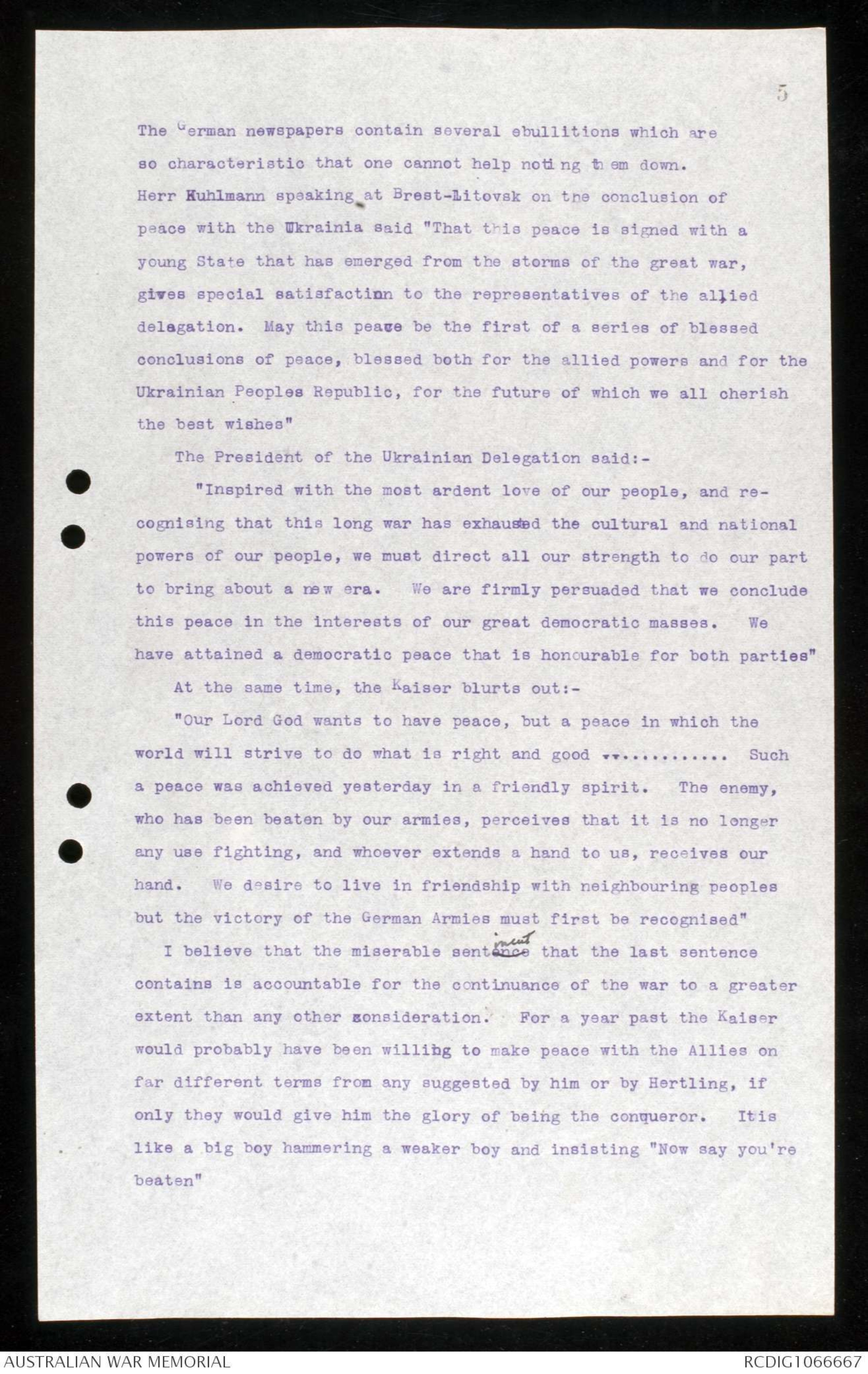
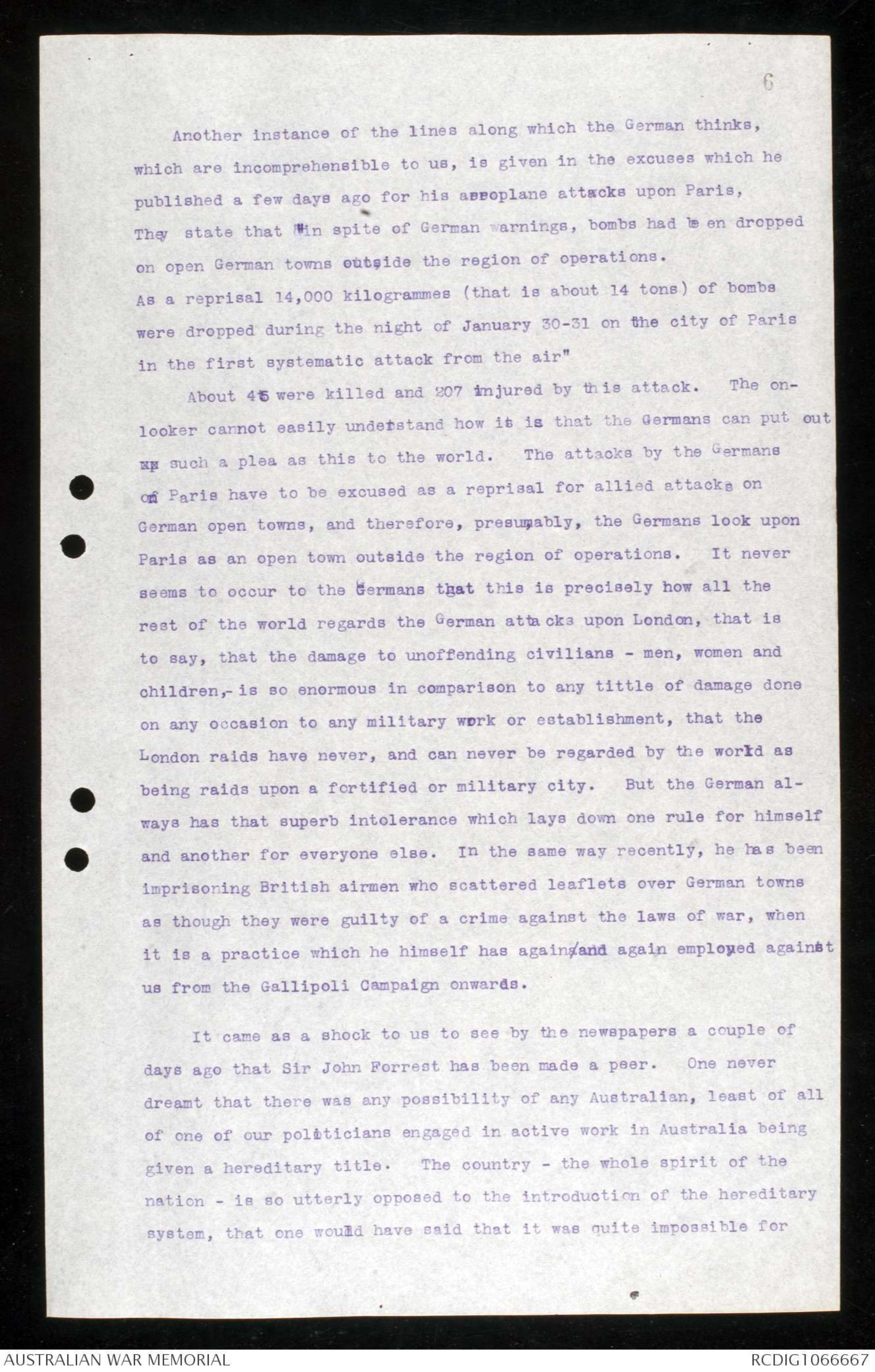
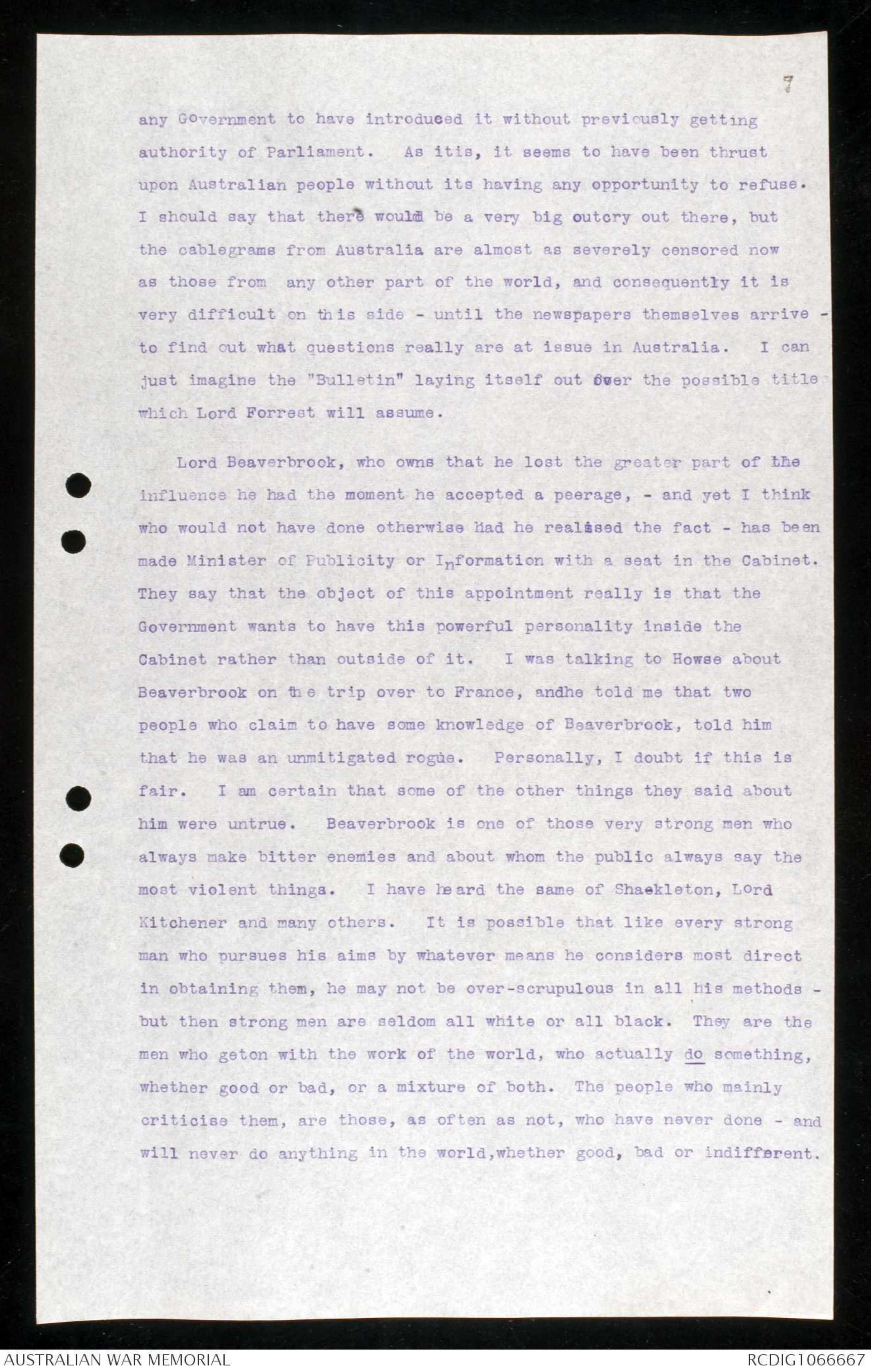
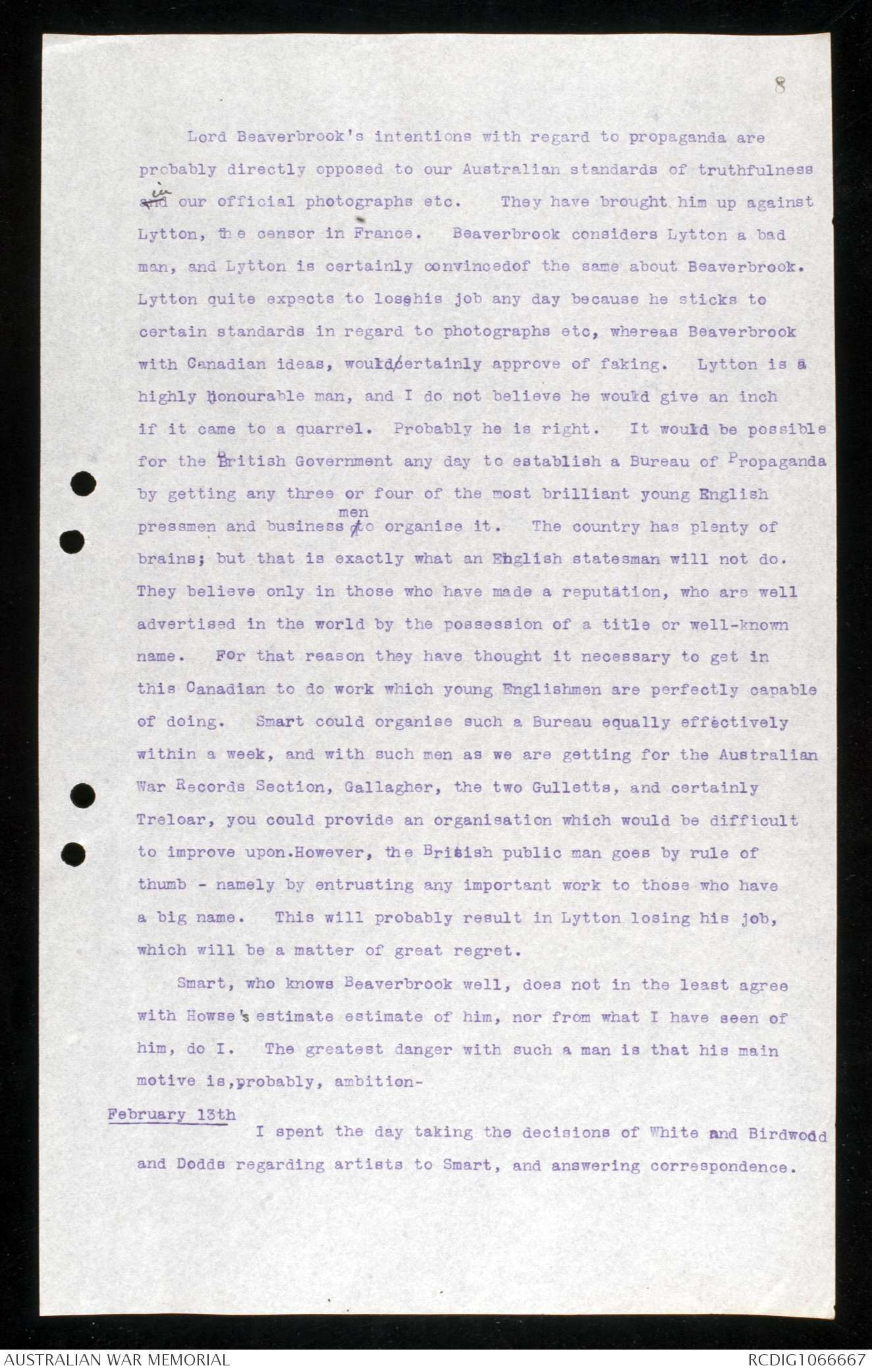
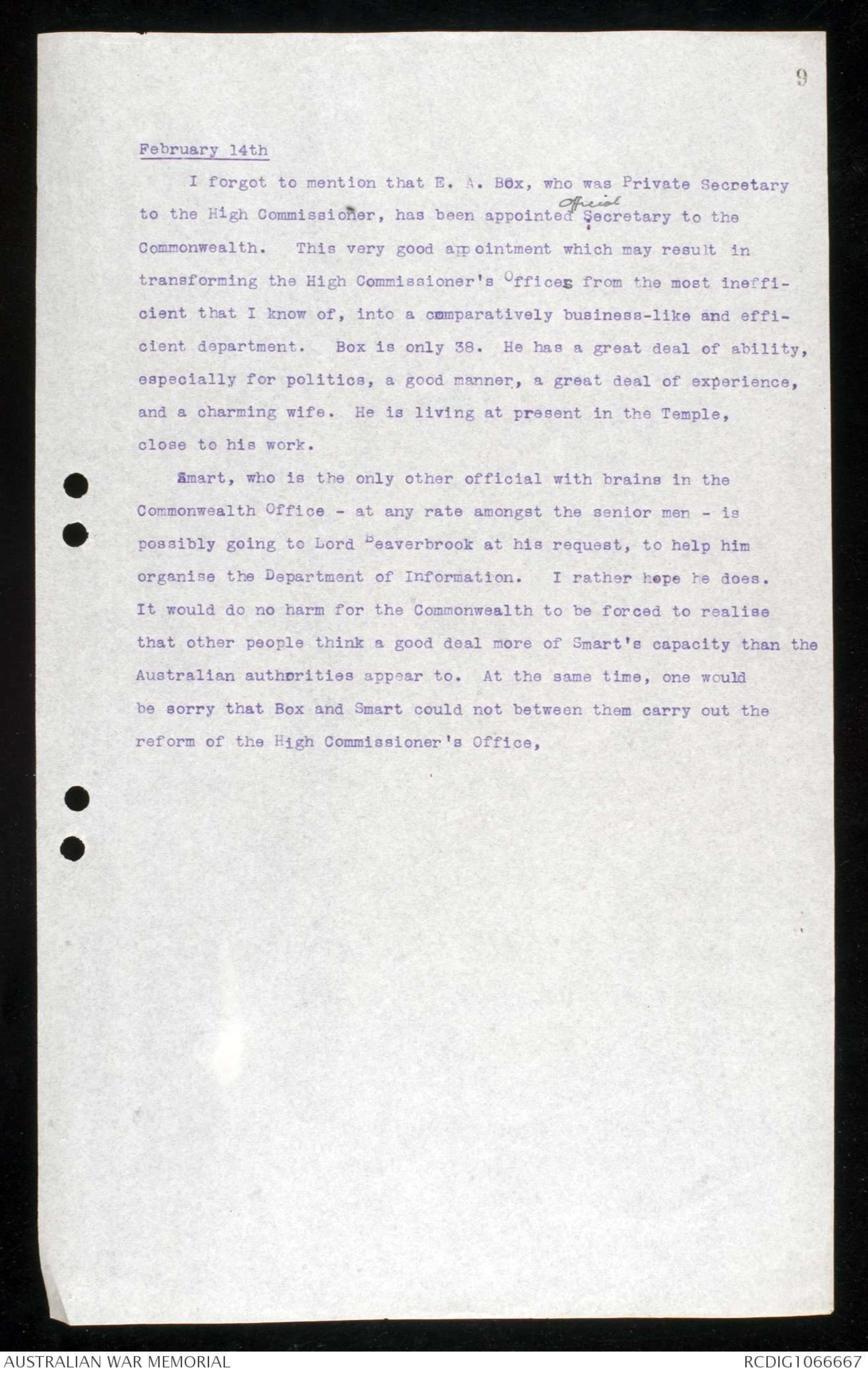
AWM38
Official History,
1914-18 War: Records of C E W Bean,
Official Historian.
Diaries and Notebooks
Item number 3DRL606/99/1
Title: Diary, February 1918
Includes references to 10th Infantry Brigade
raid at Warneton.
AWM38-3DRL606/99/1
1
February 12th - Tuesday
I crossed today from France, in order to take back to
London the decisions as to artists and many other points.
It has been like a real holiday to get back to the front for two
or three days. Although there was little or no shelling from the
Germans along the Front which we are holding, there was no doubt
in the mind of anyone there that the Germans are going to attack
within the next few weeks at another point. The War Correspondents
are allowed to discuss this in the newspapers quite openly, possibly
in order to bring to the knowledge of the Germans the fact that we
know what they are going to do and are quite ready for them.
Pefcival Phillips says that our aeroplanes have seen the Germans farxxxxx behind their front engaged in practising attacking through
the open country - such practice as we ourselves have carried out in
the past before any great push in the half expectation that we may
break through and start open warfare again. He says there is no
attempt "on their part to keep the impending offensive secret. The
date of its beginning and the points to be attacked are supposed to
be guarded carefully, but it would be impossible for them to conceal
the steady stream of fresh division
99 2
the steady stream of fresh divisions that is overrunning towns
in invaded territory, or the new concentrations of heavy artillery
and fresh stores of shells intended to support this ambitious drive.
The ground has been drying speedily during this week. It is firm
enough now for active operations in some places"
As a matter of fact, the German prisoners captured by us in the
raid on/the Warneton trenches said that they thought the big offensive
would come in Champagne. That little raid was a fine success. It
was made by the 37th and 39th Battalions, both Victorian. On Sunday
as I was going from the hut to the billet, I noticed the guns flickering
very fast in against the eastern horizon. It was clearly this raid
in progress. The time was 10 o'clock, which I found afterwards was
the hour of the raid. Sometime before, our men had obtained a map
either from a dead German officer of from someone they captured,
and on t.is map were marked certain rather important new works and
fortifications just on the north-western side of Lxys near Warneton.
It was at once decided to make this corner the object of a raid.
I suppose it was thought, firstly, that we should find a large
number of Germans there, and secondly that we might be able to
discover from the nature of the works something of their intention.
The trenches to be raided were a length of about 400 yards of front
trench, two communication trenches, one on either flank, leading
back to a support trench about 250 yards distant, and a few small
arm off-shoots to dugouts, and concrete blockhouses, just in the
rear of this support trench. The distance which our men had to
penetrate would be about 300 yards in all. The Lxys was on the right
of the attack and any flanking fire or opposition across it was to
be subdued by a thorough drenching with gas shells and smoke shells
at the hour of the raid. On the northern flank, in order to attract the
attention of the Germans on the flank, a dummy raid was put up with a
number of dummy figures, I think about 20 in all - worked by long
wires which when operated caused these figures to move and start up
as though they were scrambling arcoss Nomans Land. This sham attack,
Chinese Raid, as it is called, was put up/a little distance to the
north of the real/raid. The enemy's artillery was also to be silenced
by a drenching with gas shells and heavy shells at the moment of
3
the raid. All these arrangements went excellently. The enemy
artillery was so well marked down and had its nose so thoroughly
pinned to the ground by gas shelling, that there was practically no
reply to our guns at all. The dummy raid completely occupied the
Germans in its front. They saw the dummy figures start up and drop
down again, by the light of the flares, turned their machine guns on to
them, and so riddled them with machine gun fire, that they were not
afterwards recovered. The raiding party scoured the front German
trench, moved across to the support trench, found the Germans everywhere
there in considerable/strength, and had to fight with bombs,
revolvers and even bayonets - so General McNichol tells us - before
they were able to seize and clear most of these positions. One dugout
in the centre was found to be surrounded by newly erected wire, xx
and the small party which was told off to take it was unable to reach
it. The officer and five men from this party never got back, and as
the German press states that prisoners were made, it is clear, that
some, at any rate of these were captured. Within two minutes of
our time for retirement, the Germans started to counter-attack in a
small body from the rear against the left portion of the support
trench, but the machine gun of one of the covering parties on the
flank seems to have caught these Germans and checked them. As our
parties withdrew with the covering parties gradually falling back, one ^after
the other, and so retireding behind our troops as a sort of rearguard,
the Germans came on and followed them across Nomans Land. Here again
they were seen xxx by our covering parties - the light of shells and
of flares shews up moving figures in a night attack like this fairly
plainly - and our Lewis guns seemed to have /been brought to bear on them
by the covering parties from both flanks. They were stopped and it
is said that two or three additional prisoners were made from them.
33 or 37 prisoners in all were brought back from this raid, and very
many more would have been brought if there had been sufficient men
to spare to escort them. McNichol said that he went carefully into
the estimate of Germans killed, and by interrogating most of the men,
arrived at the conclusion that 102 Germans were killed. Probably
it is safe to estimate that the killed numbered nearly 100.
4
We lost 5 missing, 2 or 3 killed and 14 wounded. The Germans, in
their comminqué said that the fighting here "led to a violent engagement,
especially near Warneton and Armentiers". It is clear
from this that their losses made them consider the raid something of
an important fight.
The news has arrived that Trotsky has given up the struggle of
words which he/has been involved for the past two months with the
German negotiators at Brest-Litovsk, and declared the war with the
German people at an end, although he refuses to make terms of peace
with the German Givernment. The Russian armies are to be demobilised.
It is a little puzzling to see exactly what bearing this will have
on the War. Probably it is not so enormous an advantage to Germany
as appears at first sight, because with a restless socialistic people
on her flank at peace with her, and a bitter tremendous struggle
along the whole length of her opposite frontier, she is not in the
best condition for carrying on the War. It is always possible that
Trotsky has in mind the penetration into Germany of his socialistic
revolution - there can be no doubt that this is part of the
intention of the Bolsheviks/. At the same time it means of course
that Germany wipes out in one blow active warfare on her western eastern
frontier. The War now disresolves itself for her into one tremendous
struggle in the west, together with a few isolated campaigns on a
small scale in the douth-east, which if she thought it worth while to
divert her strength, she could doubtless at any moment suppress.
Roumania is necessarily out of the war, and Greece and Salonika and
possibly Mesopatamia and Egypt could no doubt be put out of the war if the
Germans thought it worth while so to disperse their strength. By
doing so, she would not end the war, and it is possible that she will
devote all her strength to xxxxx the only place where it is possible
for the decisive blow to be inflicted on us, that is to say, on the
frontier of France, Belgium or Italy.
5
The German newspapers contain several ebullitions which are
so characteristic that one cannot help noting them down.
Herr Kuhlmann speaking at Brest-Litovsk on the conclusion of
peace with the Ukrainia said "That this peace is signed with a
young State that has emerged from the storms of the great war,
gives special satisfaction to the representatives of the allied
delegation. May this peace be the first of a series of blessed
conclusions of peace, blessed both for the allied powers and for the
Ukrainian Peoples Republic, for the future of which we all cherish
the best wishes"
The President of the Ukrainian Delegation said:-
"Inspired with the most ardent love of our people, and recognising
that this long war has exhausted the cultural and national
powers of our people, we must direct all our strength to do our part
to bring about a new era. We are firmly persuaded that we conclude
this peace in the interests of our great democratic masses. We
have attained a democratic peace that is honourable for both parties"
At the same time, the Kaiser blurts out:-
"Our Lord God wants to have peace, but a peace in which the
world will strive to do what is right and good ........ Such
a peace was achieved yesterday in a friendly spirit. The enemy,
who has been beaten by our armies, perceives that it is no longer
any use fighting, and whoever extends a hand to us, receives our
hand. We desire to live in friendship with neighbouring peoples
but the victory of the German Armies must first be recognised"
I believe that the miserable sentenceiment that the last sentence
contains is accountable for the continuance of the war to a greater
extent than any other consideration. For a year past the Kaiser
would probably have been willing to make peace with the Allies on
far different terms from any suggested by him or by Hertling, if
only they would give him the glory of being the conqueror. It is
like a big boy hammering a weaker boy and insisting "Now say you're
beaten"
6
Another instance of the lines along which the German thinks,
which are incomprehensible to us, is given in the excuses which he
published a few days ago for his aeroplane attacks upon Paris,
They state that in spite of German warnings, bombs had been dropped
on open German towns outside the region of operations.
As a reprisal 14,000 kilogrammes (that is about 14 tons) of bombs
were dropped during the night of January 30-31 on the City of Paris
in the first systematic attack from the air"
About 46 were killed and 207 injured by this attack. The onlooker
cannot easily understand how it is that the Germans can put outxx such a plea as this to the world. The attacks by the Germans
on Paris have to be excused as a reprisal for allied attacks on
German open towns, and therefore, presumably, the Germans look upon
Paris as an open town outside the region of operations. It never
seems to occur to the Germans that this is precisely how all the
rest of the world regards the German attacks upon London, that is
to say, that the damage to unoffending civilians - men, women and
children,- is so enormous in comparison to any tittle of damage done
on any occasion to any military work or establishment, that the
London raids have never, and can never be regarded by the world as
being raids upon a fortified or military city. But the German always
has that superb intolerance which lays down one rule for himself
and another for everyone else. In the same way recently, he has been
imprisoning British airmen who scattered leaflets over German towns
as though they were guilty of a crime against the laws of war, when
it is a practice which he himself has again/and again employed against
us from the Gallipoli Campaign onwards.
It came as a shock to us to see by the newspapers a couple of
days ago that Sir John Forrest has been made a peer. One never
dreamt that there was any possibility of any Australian, least of all
of one of our politicians engaged in active work in Australia being
given a hereditary title. This country - the whole spirit of the
nation - is so utterly opposed to the introduction of the hereditary
system, that one would have said that it was quite impossible for
7
any government to have introduced it without previously getting
authority of Parliament. As itis, it seems to have been thrust
upon Australian people without its having any opportunity to refuse.
I should say that there would be a very big outcry out there, but
the cablegrams from Australia are almost as severely censored now
as those from any other part of the world, and consequently it is
very difficult on this side - until the newspapers themselves arrive -
to find out what questions really are at issue in Australia. I can
just imagine the "Bulletin" laying itself out over the possible title
which Lord Forrest will assume.
Lord Beaverbrook, who owns that he lost the greater part of the
influence that he had the moment he accepted a peerage, - and yet I think
who would not have done otherwise had he realised the fact - has been
made Minister of Publicity or Information with a seat in the Cabinet.
They say that the object of this appointment really is that the
Government wants to have this powerful personality inside the
Cabinet rather than outside of it. I was talking to Howse about
Beaverbrook on the trip over to France, andhe told me that two
people who claim to have some knowledge of Beaverbrook, told him
that he was an unmitigated rogue. Personally, I doubt if this is
fair. I am certain that some of the other things they said about
him were untrue. Beaverbrook is one of those very strong men who
always make bitter enemies and about whom the public always say the
most violent things. I have heard the same of Shackleton, Lord
Kitchener and many others. It is possible that like every strong
man who pursues his aims by whatever means he considers most direct
in obtaining them, he may not be over-scrupulous in all his methods -
but then strong men are seldom all white or all black. They are the
men who geton with the work of the world, who actually do something,
whether good or bad, or a mixture of both. The people who mainly
criticise them, are those, as often as not, who have never done - and
will never do anything in the world,whether good, bad or indifferent.
8
Lord Beaverbrook's intentions with regard to propaganda are
probably directly opposed to our Australian standards of truthfulness and in our official photographs etc. They have brought him up against
Lytton, the censor in France. Beaverbrook considers Lytton a bad
man, and Lytton is certainly convincedof the same about Beaverbrook.
Lytton quite expects to losehis job any day because he sticks to
certain standards in regards to photographs etc, whereas Beaverbrook
with Canadian ideas, would/certainly approve of faking. Lytton is a
highly honourable man, and I do not believe he would give an inch
if it came to a quarrel. Probably he is right. It would be possible
for the British Government any day to establish a Bureau of Propaganda
by getting three or four of the most brilliant young English
pressmen and business/men to organise it. The country has plenty of
brains; but that is exactly what an English statesman will not do.
They believe only in those who have made a reputation, who are well
advertised in the world by the possession of a title or well-known
name. For that reason they have thought it necessary to get in
this Canadian to do work which young Englishmen are perfectly capable
of doing. Smart could organise such a Bureau equally effectively
within a week, and with such men as we are getting for the Australian
War Records Section, Gallagher, the two Gulletts, and certainly
Treloar, you could provide an organisation which would be difficult
to improve upon.However, the British public man goes by the rule of
thumb - namely by entrusting any important work to those who have
a big name. This will probably result in Lytton losing his job,
which will be a matter of great regret.
Smart, who knows Beaverbrook well, does not in the least agree
with Howse's estimate estimate of him, nor from what I have seen of
him, do I. The greatest danger with such a man is that his main
motive is, probably, ambition -
February 13th
I spent the day taking the decisions of White and Birdwood
and Dodds regarding artists to Smart, and answering correspondence.
9
February 14th
I forgot to mention that E. A. Box, who was Private Secretary
to the High Commissioner, has been appointed Official Secretary to the
Commonwealth. This very good appointment which may result in
transforming the High Commissioner's Offices from the most inefficient
that I know of, into a comparatively business-like and efficient
department. Box is only 38. He has a great deal of ability,
especially for politics, a good manner, a great deal of experience,
and a charming wife. He is living at present in the Temple,
close to his work.
Smart, who is the only other official with brains in the
Commonwealth Office - at any rate amongst the senior men - is
possibly going to Lord Beaverbrook at his request, to help him
organise the Department of Information. I rather hope he does.
It would do no harm for the Commonwealth to be forced to realise
that other people think a good deal more of Smart's capacity than the
Australian authorities appear to. At the same time, one would
be sorry that Box and Smart could not between them carry out the
reform of the High Commissioner's Office,
 Lulu B
Lulu BThis transcription item is now locked to you for editing. To release the lock either Save your changes or Cancel.
This lock will be automatically released after 60 minutes of inactivity.